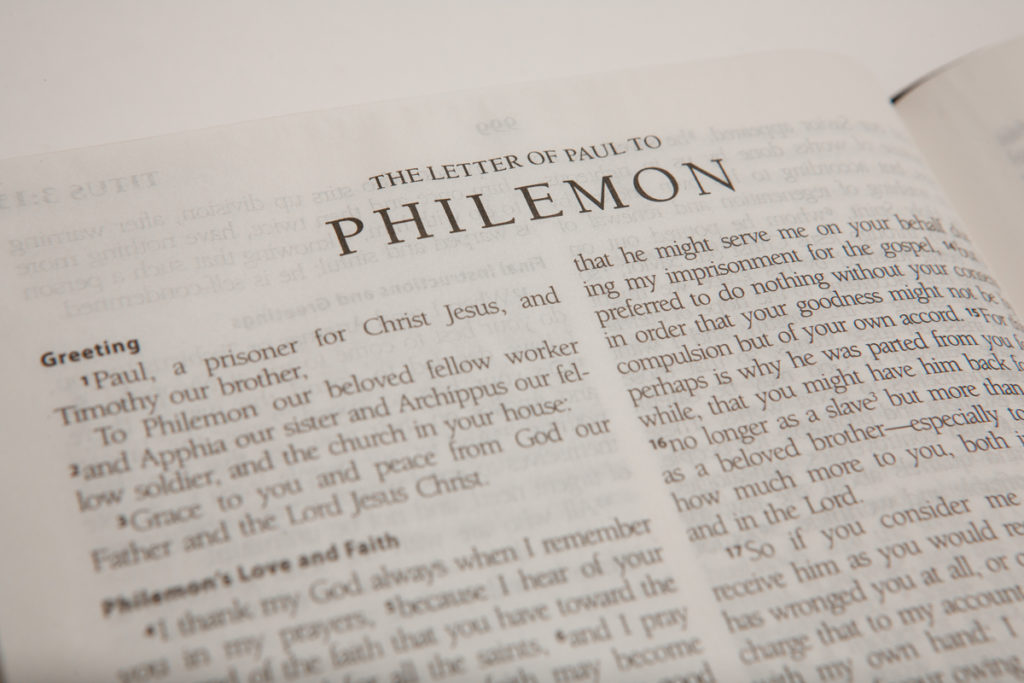“The Bible endorses slavery and oppression.” Has anyone ever heard this before? I’m sure many of us have as we’ve engaged others about faith and the Scriptures. Slavery in the Bible is a major stumbling for unbelievers towards the Christian faith. What can we do? What can we say to help others see the Bible and our faith differently?
Below are some things I believe we can say to give an honest, sobering, and encouraging answer to those with these objections.
- Historically, the Scriptures have been abused to oppress others
In 1804, Haitian slaves successfully overthrew their slave masters in what would be called the Haitian Revolution.1 It was the first time in history that slaves had successfully overthrown their masters in the West.2What soon followed is one if the greatest abuses of Scripture in recent history with the creation of the Slave Bible. Created in 1807 by the Society for the Conversion of Negro Slaves in England,3 the primary purpose of creating the Slave Bible was to help prevent slave revolts and insurrections.
What was in the Slave Bible? For context, our standard Bible consists of 66 books, divided into Old and New Testaments. We call this the canon of Scripture, a “collection of books deemed authoritative by the church.”4 Each section of our Bible was solidified centuries ago, long before the first black slaves arrived in America and the West Indies. The 39 books that make up the Old Testament were declared as early as 435 B.C.5 This means our “Old Testament was authorized and codified” before Jesus, himself, arrives on the scene.6 7 The 27 books that make up the New Testament, were affirmed by African church father Athanasius of Alexandria, in 367 A.D.,8 a millennium before the first slaves reached our Western coasts. In other words, our Bible (as it is) has been affirmed and intact for a long time.
The Slave Bible is significantly shorter than our standard Bible. Describing the Slave Bible, Anthony Schmidt, associate curator of Bible and Religion in America for Museum of the Bible, says that, “…90 percent of the Old Testament is missing [and] 50 percent of the New Testament is missing.”9 In other words, slaves were given an incomplete Bible. What we received was a distorted creation of books and verses that limit commands and precepts that pertain to freedom and equality, but affirm the submission and subjugation of people to their masters. In this act, slaves were denied the whole counsel of God because the Slave Bible fails to share the entire Gospel of Jesus Christ. This is egregious because “the Gospel is the ultimate message of liberation because at its core God is making a way to free men and women from sin and bondage. This message is the central theme of Scripture, from Genesis to Revelation, and removing any portion of it gives an incomplete picture of the heart of God. Furthermore, the Gospel’s message extends beyond our souls as it speaks to the value of our bodies, something the slave Bible misses completely.”10
- Helping People See the Truth Found in Scripture
As we engage with others and give them the Bible in its true and full context when it comes to slavery, one story in particular that can encourage us is found in the book of Philemon. The Epistle of Philemon can be paired with Colossians because Paul writes both from his Roman prison cell around the same time. In Colossians, Paul declares that in Christ, “there is not Greek and Jew, circumcision and uncircumcision, barbarian, Scythian, slave and free; but Christ is all and in all.”11 He continues by naming the virtues believers must have in their lives12 and how they are to be lived out in the context of our human relationships.13
As Paul sends his letter to the church at Colossae through Tychicus and Onesimus, he adds a personal letter to Philemon, one of the church leaders there.14 Paul writes to him because Onesimus, Philemon’s runaway slave (who also stole from him) is returning.15 We learn that while on the run, Onesimus becomes a believer in Jesus Christ and a faithful companion of Paul.16 When Paul realizes Onesimus’ backstory, he finds himself in a compromising situation.
After all, he was a Roman citizen17 but also an Israelite.18 The Roman system demanded he turn over Onesimus to his master,19 but his heritage and training in the law20 commanded, “Do not return a slave to his master when he has escaped from his master to you. Let him live among you wherever he wants within your city gates. Do not mistreat him.”21
How does Paul navigate this situation without: a) violating his conscience;22 b) disobeying Roman law;23 or c) undermining his education in the Pentateuch?
I believe his letter to Philemon demonstrates Paul’s wisdom and understanding of God’s heart masterfully:
- He honors his conscience and Roman law by sending Onesimus back to Philemon – Ultimately, Paul sends Onesimus back, but he does so with a caveat. He sincerely affirms Onesimus’ value as a person and son in the Gospel.24Paul looked past Onesimus’ societal label and saw a man redeemed and chosen in the eyes of God. In this way, Paul used his voice, influence, and pastoral heart to appeal on behalf of Onesimus.
- Hetrusted the Spirit of God to change relationships warped by broken systems – Paul also understood that he didn’t have the authority to transform an entire society when it came to the rules of slavery. But as an apostle, as a leader of the church…Paul knew the weight of his apostolic authority and used it to level the playing field in his churches. Paul uses his position to create equity, for he tells Philemon that Onesimus returns “no longer as a slave, but more than a slave—as a dearly loved brother.” Just as Paul told the church at Colossae that in Christ “there is not Greek and Jew, circumcision and uncircumcision, barbarian, Scythian, slave and free; but Christ is all and in all,” he is now putting this truth into practice and advising Philemon to do the same. Paul is inviting him to answer the call of the Gospel and receive Onesimus as an equal: both as a natural man, and as a spiritual brother.25 So does Philemon honor Paul’s request? Some scholars believe so because according to tradition, patristic father Ignatius writes about a man named Onesimus who led the church at Ephesus. He writes that this Onesimus was known for “inexpressible love” and for being “an excellent Bishop.”26 What an example of how God can redeem our lives and relationships as we walk in grace, truth, and equality.
- He understood the spirit of the law27– What we find in Old Testament law is that God commanded his people to live justly among themselves and their neighbors. They were to administer justice, cancel debts, practice generosity and extend redemption to the poor and marginalized around them. In our example, Paul lives out this truth by offering to settle the debt Onesimus may have owed. Paul is presenting himself as a mediator between Onesimus and Philemon,28 desiring to remove every obstacle that could hinder their relationship and redeem Onesimus in the eyes of Philemon. He is doing for his brother what he cannot legally do for himself. Is that what Jesus did for us? Whatever debt we had, where we were powerless over sin and the devil…Christ used his riches and his authority to free us from our chains and strongholds. In other words, Paul was simply being like Jesus.
Ultimately, the book of Philemon helps us see that Paul never affirmed the practice of slavery, in any form. Rather, our text shows that the Gospel demands “extensive change to human relationships, and where Paul could achieve this…he sought to do so.”29 I believe these examples can help give an accurate and contextual defense of the faith for those who wrestle with the Bible and slavery. Let us remember Paul’s words in Scripture and how the Spirit, through him, set the historical stage for “later generations of Christians in different social and political circumstances to realize the full significance of the Gospel of justice and grace, and to act in accordance with it,”30 as we see in the Abolitionist and Civil Rights Movements.
Let us help people see the God of the Bible, who loves, frees, redeems, and saves. As we do this, may God open the eyes of people’s hearts,31 that they may see the glorious life found in Jesus Christ.
Notes:
- Lumpkin, Joseph. The Negro Bible – The Slave Bible: Select Parts of the Holy Bible for the Use of the Negro Slaves of the British West-India Islands. Blountsville, Alabama: Fifth Estate Publishers, 2019, v.
- See Lumpkin, v.
- See Lumpkin, v.
- Erickson, Millard. The Concise Dictionary of Christian Theology. Wheaton, Illinois: Crossway Publishers, 2001, pg. 29.
- Grudem, Wayne. Systematic Theology: An Introduction to Biblical Doctrine. Grand Rapids, Michigan: Zondervan, 1994, pg. 56.
- Jenkins, Pastor Ricky. Southwest Church. September 15, 2021.
- Allison, Gregg R. Historical Theology: An Introduction to Christian Doctrine. Grand Rapids, Michigan: Zondervan, 2011, pg. 38.
- Athanasius of Alexandria. “Easter Letter 39”, in Nicene and Post-Nicene Fathers Second Series: Vol. 4, ed. Philip Schaff & Rev. Henry Wallace. New York, New York: Cosimo Books, 2007, pg. 552.
- “Slave Bible From the 1800s Omitted Key Passages that Could Incite Rebellion” https://www.npr.org/2018/12/09/674995075/slave-bible-from-the-1800s-omitted-key-passages-that-could-incite-rebellion, accessed Nov. 11, 2022.
- “Wrongfully Dividing the Word of Truth: Part 2,” https://jude3project.org/blog/2021/10/21/wrongfully-diving-the-word-of-truth-part-2, accessed Nov. 11, 2022.
- Colossians 3:11 (CSB)
- Colossians 3:12
- Colossians 3:22-4:1 (CSB)
- Drane, John. Introducing the New Testament: 3rd Edition. Minneapolis, Minnesota: Fortress Press, 2011, pg. 337.
- Colossians 4:9; Philemon 10
- Evans, Tony. The Tony Evans Bible Commentary. Nashville, Tennessee: Holman Publishers, 2011, pg. 1307.
- Acts 22:27
- Romans 11:1; Philippians 3:5
- See Drane, pg. 337.
- Acts 22:3
- 23:15-16
- Romans 14:23
- Romans 13:1-7
- Philemon 10
- Philemon 16
- See Drane, pg. 337; “The Epistle of Ignatius to the Ephesians,” https://www.newadvent.org/fathers/0104.htm., accessed Nov. 11, 2022.
- 2 Corinthians 3:6
- See Evans, pg. 1309.
- See Drane, pg. 374.
- See Drane, pg. 374.
- Ephesians 1:18
Published February 13, 2023




